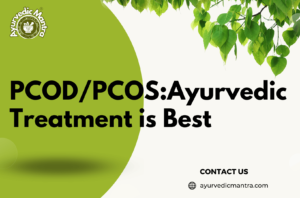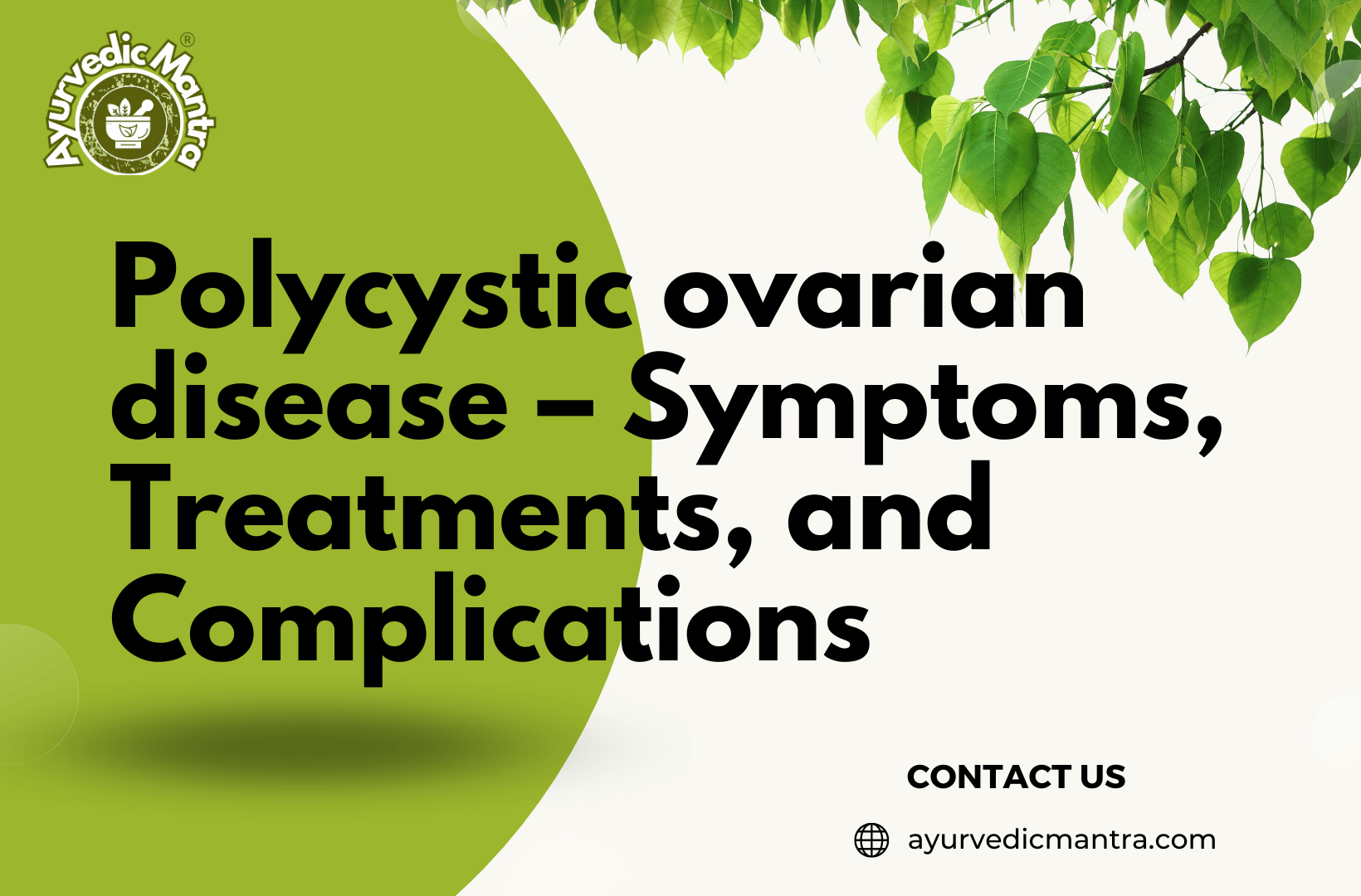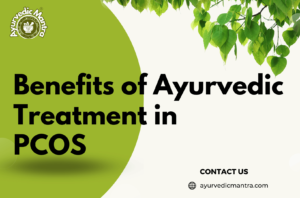
PCOD/PCOS: Ayurvedic Treatment is Best
Introduction Polycystic Ovary Disorder (PCOD) or Polycystic Ovary Syndrome (PCOS) is a common endocrine disorder affecting millions of women worldwide. It leads to hormonal imbalances,

Polycystic Ovarian Disease, commonly known as PCOD, is a hormonal disorder that affects many women worldwide. This complex condition can lead to various symptoms, treatments, and potential complications. In this comprehensive article, we will delve into the details of PCOD, its common symptoms, the available treatments, and the possible complications associated with the condition.
Polycystic Ovarian Disease is characterized by developing tiny, fluid-filled sacs (cysts) in the ovaries. These cysts are not harmful but can lead to hormonal imbalances, resulting in many troublesome symptoms. The exact cause of PCOD is not fully understood, but genetic and lifestyle factors are believed to play a significant role.
The symptoms of PCOD can vary from woman to woman, making it a challenging condition to diagnose. Some common symptoms include irregular menstrual cycles, excessive hair growth on the face and body (hirsutism), acne, weight gain, and difficulty getting pregnant. Women with PCOD may also experience mood swings and depression due to hormonal fluctuations.
Diagnosing PCOD requires a thorough evaluation by a qualified healthcare professional. The diagnostic process typically involves a detailed medical history, a physical examination, and various tests such as blood tests to measure hormone levels, pelvic ultrasound to visualize the ovaries, and sometimes, a biopsy to rule out other conditions.
While there is no cure for PCOD, several treatments aim to manage the symptoms and improve the overall quality of life for affected women. The treatment approach may vary depending on the severity of the condition and the individual’s health goals. Some standard treatment options include:
In mild cases of PCOD, lifestyle modifications can make a significant difference. Regular exercise, a balanced diet, and a healthy weight can help regulate hormones and improve symptoms.
Hormonal birth control pills are often prescribed to regulate the menstrual cycle and reduce androgen levels. Additionally, anti-androgen medications can help manage symptoms such as excessive hair growth and acne.
Women with PCOD trying to conceive may benefit from fertility treatments, such as ovulation-inducing medications or assisted reproductive technologies like in vitro fertilization (IVF).
In rare cases where PCOD causes severe pain or other complications, surgery may be considered to remove cysts or part of the ovaries. However, this is usually a last resort and is not commonly performed.
If left untreated, PCOD can lead to complications impacting a woman’s health and well-being. Some of the potential complications include:
One of the most significant concerns for women with PCOD is infertility. Irregular ovulation or the lack of ovulation can make it challenging to conceive naturally.
PCOD is associated with insulin resistance, which can increase the risk of developing type 2 diabetes and cardiovascular diseases if not properly managed.
Women with PCOD have a higher risk of developing endometrial cancer due to irregular menstrual cycles and unopposed estrogen exposure.
Polycystic Ovarian Disease is a complex hormonal disorder that affects many women worldwide. It can lead to distressing symptoms, impact fertility, and even result in severe complications if not addressed appropriately. Early diagnosis and effective management through lifestyle changes, medications, and, if necessary, fertility treatments can significantly improve the quality of life for women with PCOD. If you suspect you have PCOD or are experiencing any concerning symptoms, it is essential to consult a healthcare professional for a proper evaluation and personalized treatment plan. Remember, managing PCOD is possible, and with the right approach; many women can lead fulfilling lives despite the challenges posed by this condition.
Polycystic Ovarian Disease, or PCOD, is a hormonal disorder affecting the ovaries. It is characterized by the development of tiny, fluid-filled sacs (cysts) in the ovaries, which can lead to hormonal imbalances and a range of symptoms such as irregular menstrual cycles, excessive hair growth, acne, and difficulty getting pregnant.
The exact cause of PCOD is not fully understood, but it is believed to involve a combination of genetic and lifestyle factors. Insulin resistance and high levels of androgens (male hormones) play a significant role in developing PCOD.
Diagnosing PCOD requires a thorough evaluation by a healthcare professional. The diagnostic process typically involves taking a detailed medical history, conducting a physical examination, and performing various tests such as blood tests to measure hormone levels, pelvic ultrasound to visualize the ovaries, and sometimes, a biopsy to rule out other conditions.
The symptoms of PCOD can vary from woman to woman. Still, some common signs include irregular menstrual cycles, hirsutism (excessive hair growth on the face and body), acne, weight gain, and difficulty getting pregnant. Hormonal fluctuations in PCOD may also lead to mood swings and feelings of depression.
Yes, PCOD can affect fertility. Irregular ovulation or the lack of ovulation can make it challenging for women with PCOD to conceive naturally. However, with proper management and treatment, many women with PCOD can still achieve successful pregnancies.
There is no cure for PCOD, but several treatment options aim to manage the symptoms and improve the overall quality of life for affected women. Treatment approaches may include lifestyle changes such as regular exercise and a balanced diet, hormonal medications to regulate menstrual cycles and reduce androgen levels, fertility treatments, and in rare cases, surgical interventions.
Yes, lifestyle changes can make a significant difference in managing PCOD. Regular exercise, a healthy weight, and a balanced diet can help regulate hormones and improve symptoms. Managing stress and getting enough sleep are also essential for overall well-being.
If left untreated, PCOD can lead to various complications. Women with PCOD have an increased risk of developing type 2 diabetes, cardiovascular diseases, and endometrial cancer due to irregular menstrual cycles and hormonal imbalances. Early diagnosis and proper management are crucial in minimizing these risks.
PCOD is not typically cured with surgery. Surgery may be considered in rare cases where PCOD causes severe pain or complications and involves removing cysts or part of the ovaries. However, surgery is usually a last resort and is not commonly performed for PCOD management.
While it is not always possible to prevent PCOD since genetic factors play a role, maintaining a healthy lifestyle with regular exercise, a balanced diet, and managing stress can help reduce the risk of developing the condition or alleviate its symptoms if already diagnosed.
Remember, if you suspect you have PCOD or are experiencing any concerning symptoms, it is essential to consult a healthcare professional for proper evaluation and personalized treatment. Effective management of PCOD can significantly improve your quality of life and overall well-being.

Introduction Polycystic Ovary Disorder (PCOD) or Polycystic Ovary Syndrome (PCOS) is a common endocrine disorder affecting millions of women worldwide. It leads to hormonal imbalances,

Introduction Losing weight is a journey that requires dedication, consistency, and self-care. While there are numerous weight loss techniques out there, not all of them

Polycystic Ovary Syndrome (PCOS) is a hormonal disorder that affects millions of women worldwide. It can lead to various health complications, such as irregular periods,

In recent years, Ayurveda, an ancient system of natural healing originating from India, has gained significant popularity as an alternative approach to treating various health

आजकल वजन बढ़ने और चर्बी की वृद्धि होने की समस्या एक आम समस्या बन गई है। बढ़ते वजन और अतिरिक्त चर्बी के कारण न केवल

प्रस्तावना: आजकल वजन बढ़ने और ओबेसिटी की समस्या एक आम समस्या बन गई है। बढ़ते वजन के कारण न केवल शारीरिक समस्याएं होती हैं, बल्कि
